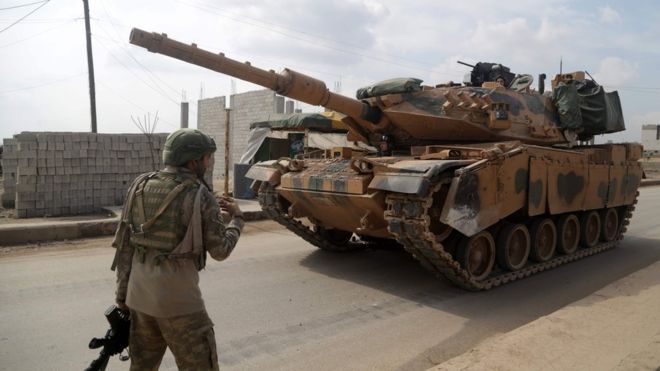
- At least 33 Turkish soldiers have been killed in an air strike by Syrian government forces in north-west Syria, a senior Turkish official has said.
At least 33 Turkish soldiers have been killed in an air strike by Syrian government forces in north-west Syria, a senior Turkish official has said.
More were hurt in Idlib province, said Rahmi Dogan, the governor of Turkey’s Hatay province.
Turkey retaliated by attacking Syrian government targets.
Russia, Syria’s key military ally, said the Turkish troops had been operating alongside jihadist fighters when they were attacked by Syrian forces.
It denied its own air force had been involved in the fighting in the Behun area.
Government forces supported by Russia have been trying to retake Idlib from rebels who are backed by Turkey and the air strike came after the rebels retook the key town of Saraqeb.
The Syrian authorities themselves have so far made no public comments on the latest escalation in Idlib, the last Syrian province to remain in opposition hands.
Reports suggest Turkey, a key member of the Nato alliance, may be relaxing its border controls to allow Syrian refugees to seek refuge in the EU.
What do we know about the air strike?
It reportedly occurred on Thursday evening.
“Thirty-three of our soldiers were martyred as a result of the air strike… by the forces of the [Bashar al-]Assad regime,” Mr Dogan was quoted as saying by the state-funded Anadolu news agency.
Those wounded were being treated in hospital in Turkey but none were in a critical condition, he added.
After President Recep Tayyip Erdogan held an urgent top-level security meeting in Ankara, Turkish forces began conducting ground and air strikes on “all known” Syrian government targets, Turkish communications director Fahrettin Altun said.
According to the Russian defence ministry, the Turkish soldiers had been killed in a “bombardment” while operating alongside “terrorists” in the Behun area where, it said, fighters from the Hayat Tahrir al-Sham alliance (formerly the Nusra Front) were attacking Syrian government forces.
Russia said it was in constant contact with Turkey to ensure Turkish troops were not targeted in Idlib and had not been informed that Turkish forces were active at Behun.
An unconfirmed Russian media report says two Russian warships equipped with cruise missiles are being sent towards the Syrian coast.
President Erdogan wants Syrian government forces to pull back from positions where Turkey has set up military observation posts and earlier threatened to attack them if they did not halt their advance.
But Syria’s government and Russia have rejected his demand to pull back to ceasefire lines agreed in 2018. Russia has also accused Turkey of violating the 2018 ceasefire by backing rebels with artillery fire.
In reaction to the crisis:
- Nato Secretary General Jens Stoltenberg spoke by phone to Turkish Foreign Minister Mevlut Cavusoglu and “condemned the continued indiscriminate air strikes by the Syrian regime and its backer Russia in Idlib province”
- A spokesman for the US state department said: “We stand by our Nato ally Turkey and continue to call for an immediate end to this despicable offensive by the Assad regime, Russia and Iranian-backed forces. We are looking at options on how we can best support Turkey in this crisis”
- UN Secretary General António Guterres expressed “grave concern” over the latest escalation, calling for an immediate ceasefire.
How is the crisis affecting the humanitarian situation?
The fighting in Idlib has driven nearly a million Syrians from their homes since December and the UN says a full-scale battle there could result in a “bloodbath”.
Turkey has already taken in some 3.7 million refugees and Turkey’s exasperation may lead it to send a new wave of refugees towards Europe.
Unnamed Turkish sources told international news agencies on Friday that the country was indeed lifting border controls to allow refugees to try to travel to the EU.
“We will no longer keep the doors closed for refugees who want to go to Europe,” one source told AFP.
Several hundred people are reported to have gathered on the Turkish border at Dikili in the hope of crossing illegally to Greece.
“We are going to Greece, we have packed up and arranged our money,” one unidentified person told Turkey’s IHA news agency.
“We came here to prepare our boats and we will also prepare our equipments. We will go to Greece from here.”
Under a 2016 agreement with the EU, which followed a wave of Syrian refugees and refugees and migrants from other countries to Europe, Turkey imposed stronger controls to curb the flow.
The deal involved an EU pledge to provide €6bn (£5.4bn; $6.6bn) in aid to Turkey to house Syrian refugees.
Russia has rejected calls in the UN Security Council for a humanitarian ceasefire in northern Syria.
Responding to a statement from Belgium and Germany that the killing of civilians must stop, the Russian ambassador said the only solution was to chase what he called the terrorists from the country.



